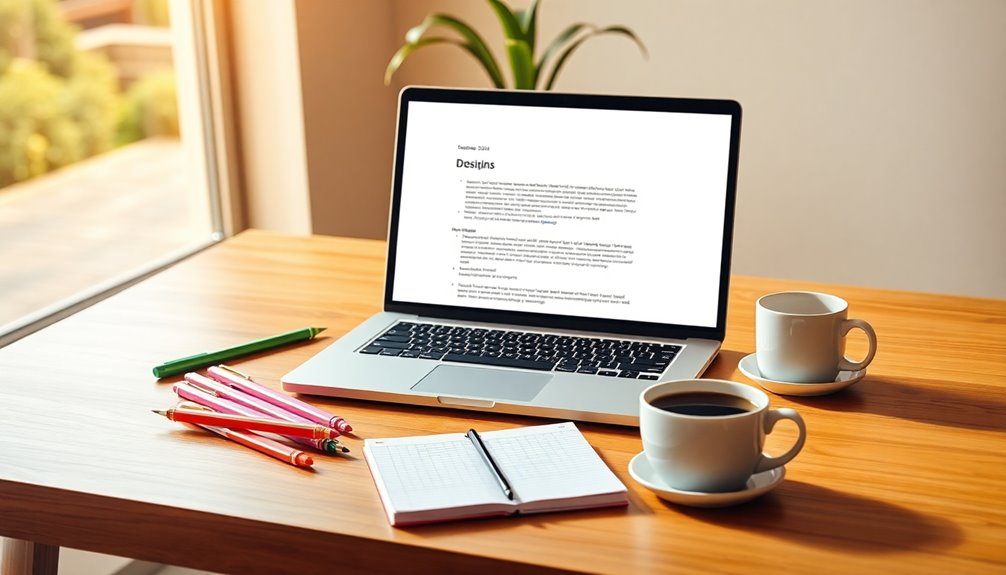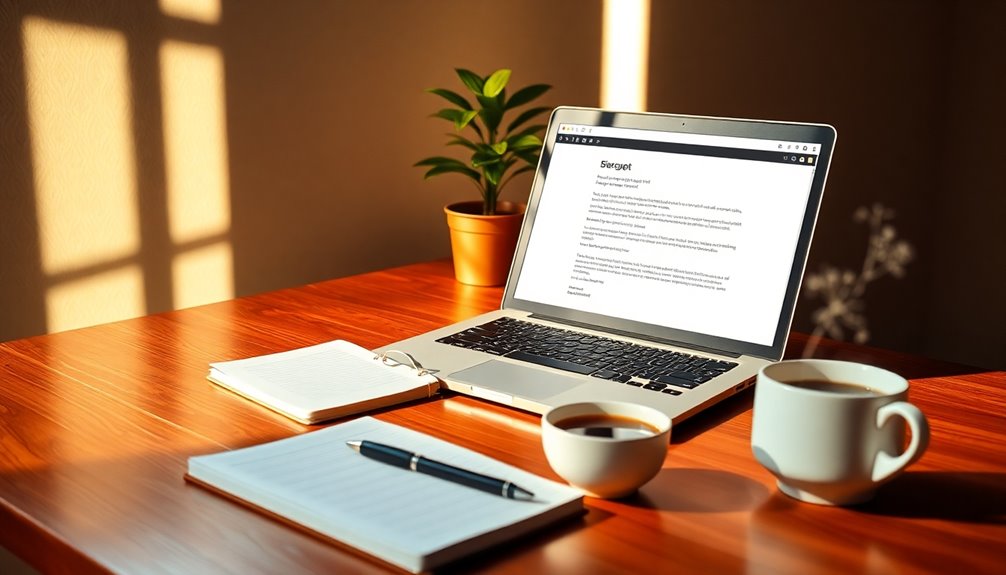To write a good email that gets the job done, start with a clear and engaging subject line that reflects the email's content. Structure your message using short paragraphs and bullet points for easy scanning. Clearly state your purpose early on, and make your requests straightforward with a specific call to action. Proofread your email to eliminate errors and maintain professionalism. Keep your tone friendly yet professional to build credibility. These strategies can enhance the effectiveness of your emails and lead to better engagement. Stick around to uncover more tips that can elevate your email game!
Key Takeaways
- Craft a clear and concise subject line that accurately reflects the email's content to encourage recipients to open your message.
- Structure your email with short paragraphs and bullet points to enhance readability and make key information easy to find.
- Clearly state the email's purpose at the beginning to ensure quick understanding and prioritize responses from the recipient.
- Use direct and action-oriented language when making requests, specifying desired outcomes and next steps to encourage prompt engagement.
- Proofread your email for spelling and grammatical errors to maintain professionalism and foster credibility in your communication.
Introduction

A strong email introduction is crucial for grabbing your recipient's attention right away. First, focus on crafting a compelling subject line; studies show that a clear and relevant subject can boost open rates by up to 47%. It sets the expectation for your message and encourages the recipient to engage with your email.
Next, choose an appropriate email greeting. Using a professional greeting like "Dear [Name]" or "Hi [Name]" establishes respect and maintains a formal tone. This simple touch shows you value the recipient, making them more likely to read on.
In the opening lines, clearly state the purpose of your email. This helps recipients quickly understand the context and prioritize their responses. You want them to know why you're reaching out without sifting through unnecessary details.
Builds Professional Credibility
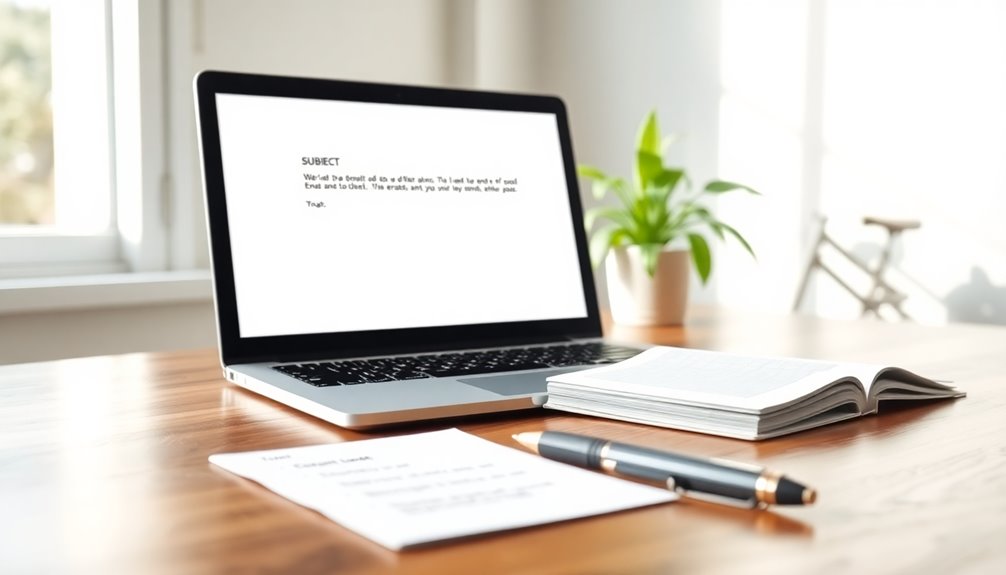
Consistently crafting well-structured emails not only showcases your attention to detail but also respects your recipient's time, which is essential for building professional credibility. When you write an email, ensure it's organized and to the point. This clarity demonstrates that you value both your message and your recipient's time.
Using a clear subject line that reflects your email's content can significantly improve engagement and response rates, showing your organizational skills. It sets the tone for what to expect, making it easier for your recipient to prioritize your message.
Maintaining a professional tone throughout your email is crucial. Avoiding jargon fosters clarity, making it easier for others to understand your intent. Additionally, being mindful of how credit cards play a significant role in financial transactions can enhance your understanding of payment-related communications. Implementing structured data in your content can also enhance clarity and organization in your emails.
Always be timely with your responses; acknowledging received emails reinforces reliability and professionalism, which further establishes your credibility in the workplace.
Lastly, thorough proofreading for spelling and grammatical errors is vital. Mistakes can diminish your perceived professionalism and accuracy, so take the time to review your work before hitting send. Additionally, using segmentation of audience in your email strategy can lead to more targeted and effective messaging.
Clear and Relevant Subject Line
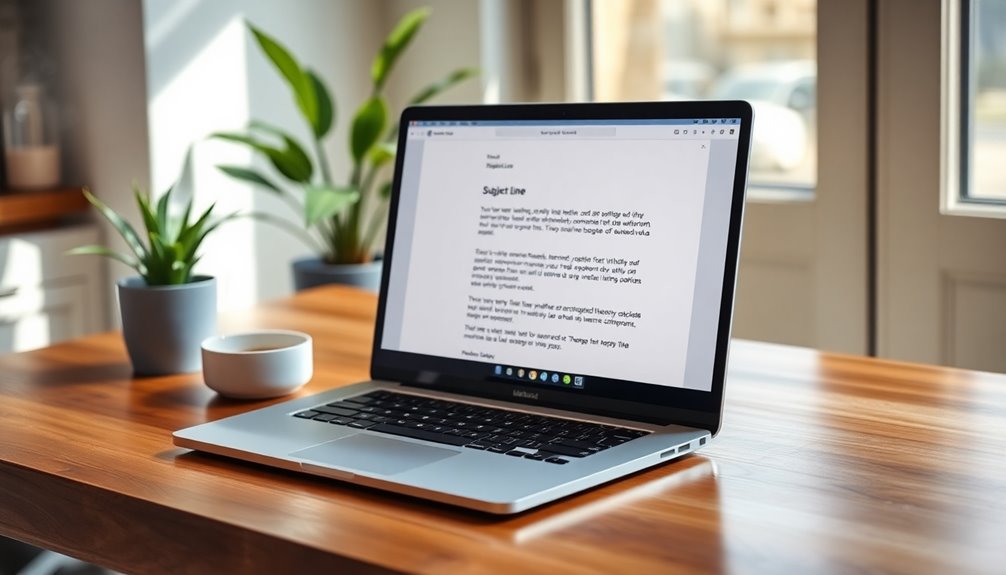
When crafting an email, the subject line serves as your first impression and can significantly impact whether your message gets opened. A clear and concise subject should ideally be limited to 60 characters to effectively convey the email's purpose. This encourages engagement and helps the recipient quickly grasp key information.
Using action-oriented language in your subject line can notably increase open rates. Instead of vague phrases, specify the email's goal directly. For instance, "Request for Project Update" is much clearer than "Update Needed." Additionally, ensuring you have a well-structured approach can lead to improved email engagement rates.
Incorporating necessary cookies for basic site functionalities can enhance user experience, which parallels the importance of clarity in your email subject lines. Remember, E-Mail Etiquette emphasizes that vague or overly complex subject lines often lead to confusion, causing recipients to overlook or misinterpret your intent.
Including relevant keywords enhances searchability, allowing recipients to identify your email's context among numerous messages. Crafting compelling subject lines, much like newspaper headlines, not only boosts reader interest but also prompts quicker responses. Additionally, keeping in mind the principles of high-quality content can further improve the effectiveness of your communication.
A great subject line sets the tone for effective communication, so take the time to create one that's both clear and relevant. This small effort can make a significant difference in how your emails are received and acted upon.
Step-by-Step Guide to Writing Requests
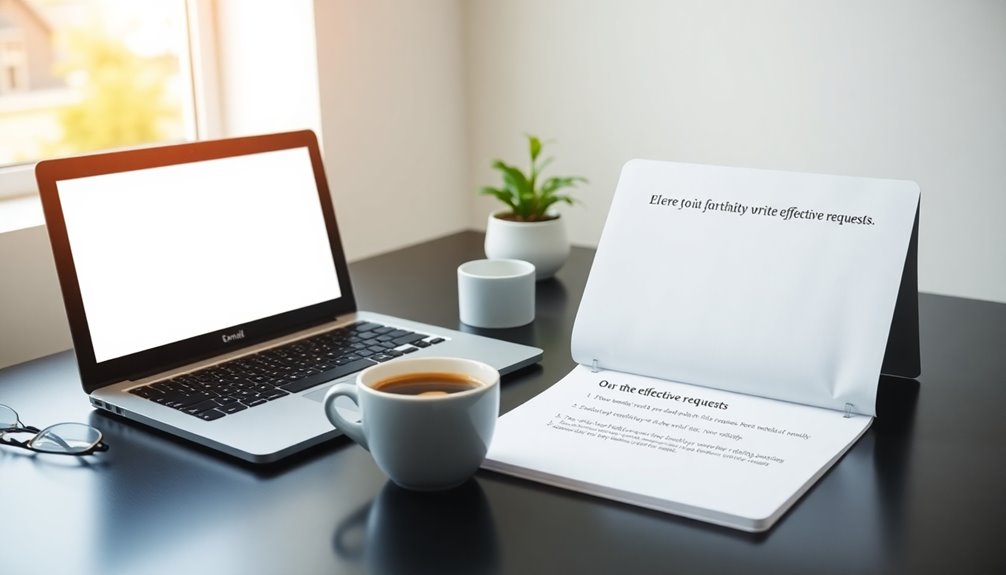
Crafting an effective request email involves a strategic approach to ensure your message is clear and actionable. Start by writing emails with a clear subject line that specifies your request. Use action-oriented language to grab attention and encourage prompt engagement.
In the body of your email, succinctly explain the request. Provide necessary context but keep it brief. Organize your thoughts using short paragraphs or bullet points to enhance readability. This makes it easier for the recipient to grasp your request quickly.
Clearly articulate your desired outcome. Specify the actions you need from the recipient to avoid any confusion. This clarity is crucial for facilitating a timely response.
Dos and Don'ts for Job Emails

Writing emails for job-related purposes requires a distinct approach that balances professionalism with clarity. To write a professional email, start with a clear and concise subject line, ideally under 60 characters. This helps convey your email's purpose and increases the likelihood of it being opened.
Always begin with a formal greeting, like "Dear [Name]," to set a respectful tone, especially for potential employers.
Don't overlook the importance of proofreading your email for any spelling or grammatical errors. Mistakes can diminish your credibility and professionalism. Avoid using vague language; clearly stating your purpose early in the email allows recipients to prioritize their responses effectively.
Include a clear call to action in your email. Specify what you'd like the recipient to do next, whether it's answering interview questions or confirming a meeting. This can significantly enhance engagement and response rates.
Examples of Request Emails

A well-structured request email can make a significant difference in how your message is received and responded to. To start, make sure your subject line is clear and direct, like "Request for Project Update." This helps the recipient immediately understand the purpose of your email. Additionally, consider the importance of sugar content in your communications, especially if your request involves health-related topics. Incorporating efficient payment solutions can also enhance your overall communication strategy, particularly in industries such as transportation and healthcare. A well-defined SEO strategy can also help in crafting messages that resonate with your audience.
In the body, articulate your request clearly, providing any relevant context and specific details. Keep in mind that short paragraphs enhance readability. Including relevant metrics or data can further clarify your request and strengthen your position. A good understanding of financial terms can also help you communicate your needs more effectively.
Don't forget to include a polite call to action, such as "Could you please provide the status by Friday?" This encourages timely responses and clarifies your expectations. Being concise and to the point can also aid in achieving your desired outcome.
At the end of every email, express gratitude with a line like, "Thank you for your assistance." This fosters goodwill and showcases your professionalism. Remember that a well-crafted message can greatly influence the recipient's willingness to assist you.
Before hitting send, always proofread your request email for spelling and grammatical errors. Simple mistakes can undermine your credibility and the seriousness of your request. Additionally, incorporating a data-driven decision-making approach can help you refine your communication strategy for better responses.
Pro Tips for Writing Effective Emails

Effective emails can set the tone for productive communication, so getting them right is crucial. Start with a clear and concise subject line, ideally under 60 characters, that accurately reflects the email's content. This ensures your email is read and grabs the recipient's attention immediately.
When writing professional emails, structure your message with short paragraphs and bullet points. This enhances readability and makes it easier for recipients to scan for key information. Keep your tone positive and avoid jargon to ensure clarity and facilitate collaboration.
One of the most important aspects of effective emails is your call to action. Clearly outline the desired response or next steps to increase the likelihood of engagement from the recipient. Whether you need a quick reply or want to schedule a meeting, make it explicit.
Lastly, always proofread your email for spelling and grammatical errors. Even small mistakes can undermine your professionalism and credibility.
Final Thoughts
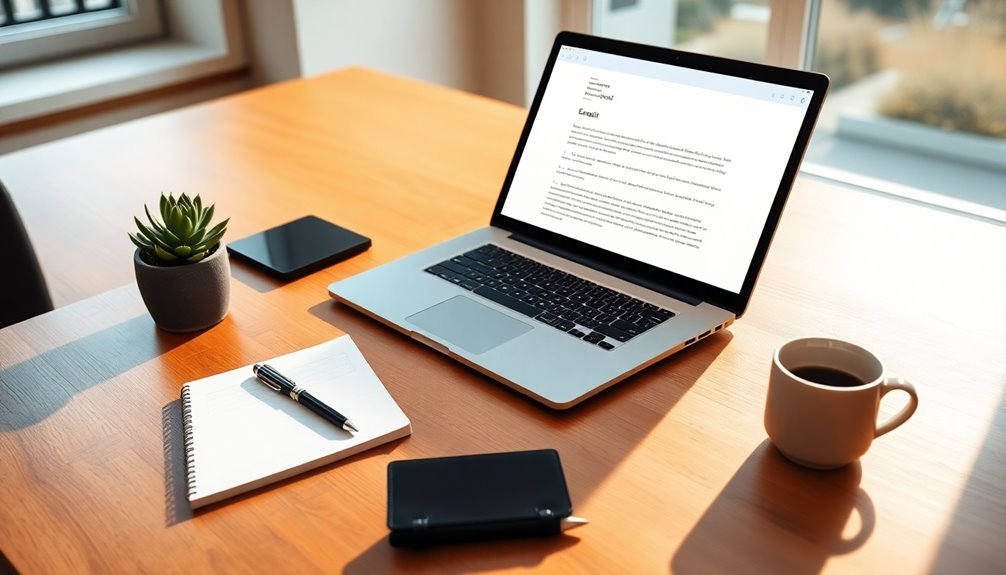
Reflecting on the importance of crafting well-structured emails, you'll find that mastering this skill can lead to more efficient communication and stronger professional relationships.
Since 90% of professionals rely on email as their primary form of communication, it's crucial to understand exactly what to expect from your messages.
Start with a clear subject line and concise greeting to set a professional tone. This helps recipients grasp the email's purpose immediately.
Using a structured format with short paragraphs and bullet points enhances readability, allowing busy professionals in digital marketing and other fields to quickly identify key information and action items.
Maintaining a professional tone is vital; avoiding jargon fosters collaboration and aligns with workplace culture.
Plus, proofreading your emails properly can save you from potential misunderstandings caused by errors or unclear language.
Frequently Asked Questions
How Do You Write an Email for Work Done?
To write an effective email for work done, start with a clear subject line that summarizes your message.
Use a professional greeting and dive straight into the purpose of your email in the opening paragraph. Subject: Request for Guidance on Research Project Dear Professor [Last Name], I hope this email finds you well. I am reaching out to seek your guidance regarding my ongoing research project and to inquire about related resources that could strengthen my work. While researching best practices for academic correspondence, I came across insights on how to email a professor effectively, which emphasized the importance of clarity and respect. Following those principles, I wanted to ensure this email succinctly communicates my request for your expertise and time. Please let me know if we could schedule a brief meeting to discuss this further.
Organize your content into short paragraphs or bullet points for easy reading.
How Do You Write an Email After Getting a Job?
When you write an email after getting a job, start with a professional greeting, addressing the recipient by name.
Express your gratitude for the offer and share your excitement about joining the team.
Clearly confirm your acceptance, mentioning your position title and start date.
If there are next steps, like paperwork or orientation, outline those briefly.
How to Write an Impactful Email?
To write an impactful email, start with a strong subject line that grabs attention.
Use short paragraphs and bullet points to keep your message clear and easy to read.
Include a specific call to action, so the recipient knows what you expect next.
Maintain a professional tone, avoiding jargon that could confuse them.
How Do You Write a Well Done Email?
To write a well-done email, start with a clear subject line that grabs attention.
Use a professional greeting to set the right tone.
Organize your content with short paragraphs and bullet points for better readability.
Include a specific call to action, so the recipient knows what you want them to do next.
